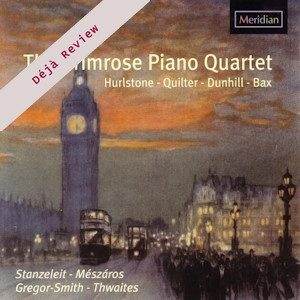
Déjà Review: this review was first published in June 2005 and the recording is still available.
William Hurlstone (1876-1906)
Piano Quartet in E minor op. 43 (1904)
Roger Quilter (1877-1953)
Gipsy Life (1935)
Thomas Dunhill (1877-1946)
Piano Quartet in B minor op. 16 (1903)
Sir Arnold Bax (1883-1953)
Piano Quartet in One Movement (1922)
Primrose Piano Quartet
rec. 2003
Meridian CDE84519 [73]
Once again this disc points up the yawning gulf that separates most pre-Great War works from those written after the conflict. Sunnily romantic Brahmsian heroics of various stamps dominate the years from 1895 to 1914 (with some carry-over). There was a tendency after 1918 for works to find and fasten on to frivolity, or severity or brutality.
Bax‘s 1922 Piano Quartet illustrates the psychological gear-change. It is bitter, terse, violent and has no time for the luxury of expansive romantics. Bax had found the same track as Bartók who by coincidence was also championed by the pianist Harriet Cohen. The quartet may be in one movement but it is no Cobbett-style Phantasy. The same work also exists in a version for piano and orchestra under the title Saga-Fragment. This has been recorded by Margaret Fingerhut on Chandos [review].
The Dunhill Piano Quartet is from 1903 and speaks in smooth and gracious numbers. The language is broadly Brahmsian and will occasion no listener any difficulty in coming to appreciation. The regal writing in the allegro moderato recalls the muscular optimism of the Brahms second piano concerto but flecked with episodes of self-doubt.
However the disc opens with Hurlstone‘s Piano Quartet. The allegro moderato is tumultuously put across by the Primrose. You can ‘hear’ the flames licking at the heels in the masterful peroration to the movement. Then comes the committed writing and playing of the andante cantabile. This is touchingly Brahmsian material – a trembling Viennese sunset of a piece. The red-blooded Vivace ma non troppo is unflinchingly played and recording. This is no-holds-barred romantic writing with a Dvořákian roll at 1:50 melded with British folksong. The finale starts lento non troppo and moves into an allegro giocoso; an approximately similar tempo and mood as for the Dunhill. The finale positively shouts élan and there is cracking coordination from all the players. This is a really spirited reading with the engineers and any one else attending the sessions surely having had to bite their lips at the end to avoid a shouted and thundered applause. The music is very exciting and sanguine recalling the manly heroics of Dvorak’s Piano Concerto and Beethoven’s Triple Concerto. An English flavouring also enters with a folksy feeling looking forward to Moeran’s Bank Holiday and Grainger’s Shepherd’s Hey.
The Quilter is a brief genre piece with an Irish accent and a zingharese flavour. Dvořák’s Slavonic Dances and Brahms’ Hungarian Dances convey some of the same enraptured and volatile dancing spirit.
I especially liked the Primrose Quartet’s alertness to the rhythmic life of these pieces particularly in the finales of the Dunhill and Hurlstone and in the torrential Dvořák-inflected Dunhill scherzo.
This is a classic and generous collection of rare English chamber music. I look forward to much more from this source. Predominantly for those with a taste for music written under the benevolent but far from exclusive aegis of Brahms and Dvořák.
Rob Barnett
Buying this recording via a link below generates revenue for MWI, which helps the site remain free


















